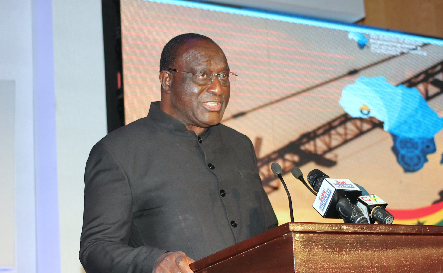
African Engineering week opens in Accra
The Minister of Trade and Industry, Mr. Alan Kyerematen, has urged engineers on the continent to strategically position themselves to leverage the opportunities presented by the implementation of the African Continental Free Trade Agreement (AfCFTA).
He has, therefore, outlined three major strategic areas for the engineers to develop their capabilities in order to reap the benefits of the single African market.
Advertisement
The strategic areas are engineering services related to production and the installation of production infrastructure, trade-related infrastructure and trade in services.
The Trade and Industry Minister outlined the strategic areas at the 7th edition of the African Engineering week in Accra yesterday.
Event
Organised by the Ghana Institution of Engineering, the four-day event also coincides with the 5th Africa Engineering Conference.
It is in collaboration with the Federation of African Engineering Organisation, the World Federation of Engineering Organisation and United Nations Educational, Scientific and Cultural Organisation (UNESCO).
It is on the theme: “Engineering, Inter-African Trade and the Sustainable Development Goals”.
Key among the issues to be discussed include goods and services, capacity building for trade, trade integration and interconnectivity, women and young engineers in trade, Alternative Dispute Resolution and Infrastructure and Intellectual Property rights.
Mr. Kyerematen said for any country to harness the benefits of AfCFTA, they had to produce goods which could be traded or sold to other African countries, adding that “without production or value addition, there can be no AfCFTA”.
“I believe this calls for the mobilisation and deployment of engineering capacity and capabilities to support production in various strategic sectors in which African countries have comparative advantage,” Mr. Kyerematen said.
Infrastructure
The President of the Federation of African Engineering Organisations (FAEO), Mrs. Carlien Bou-Chedid, in her remarks said in order to facilitate trade across borders, there was the need for engineers to be provided with critical infrastructure including roads, rail, air transport, and digital infrastructure among others.
She said many products benefited from engineering inputs, adding that the critical role played by engineering must be recognised and raised to levels of competence to deliver world-class products.
She noted that for far too long, the continent had depended on products and services from other continents despite the skill sets available in Africa adding: “It is high time Africa takes full advantage of the knowledge, skills and products available within it to develop the whole of Africa”.
Mrs. Bou-Chedid added that although AfCFTA was a potential game changer, there was more work to be done to enable engineers to tap into its prospects.
“There will be the need to improve barriers to trade in engineering goods and services by harmonising codes and standards,” she added.
Again, she noted that the FAEO sought to develop sufficient, diverse, inclusive and a competent workforce, relevant engineering industries for Africa to engage in safe, ethical and sustainable practice.
“At FAEO, We are convinced that Africa cannot develop without engineering and we have positioned ourselves to be the organisation that drives the sustainable socio-economic development of Africa through engineering.
“To this end, we shall be working to promote and advance the science and practice of engineering for the benefit of society,” she added.
Tariffs
For his part, the President of the Ghana Institution of Engineering (GhIE), Rev. Prof. Charles Anum Adams, said in spite of some successes in eliminating tariffs within regional communities, the African market remained highly fragmented, a situation which had the tendency to undermine free trade within the continent.
He added that the non-tariffs and regulatory barriers increased transaction cost and limited the movement of goods and services within the continent.
“By imposing unnecessary tariffs on exporters, these barriers raise prices for consumers, undermine the predictability of the trade regime and reduce investment in the region,” he said.
He urged the government to create opportunities for all to attract young people to consider engineering as a vocation and profession.



